研究生英语精读教程-翻译
研究生英语精读教程课文原文+翻译+短文unit4
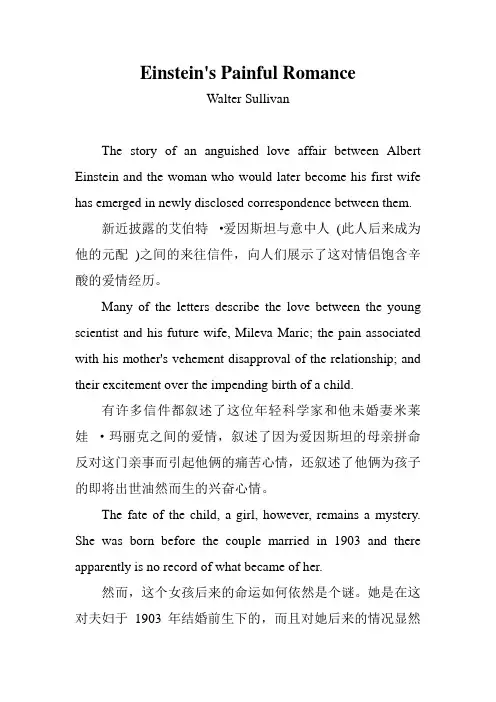
Einstein's Painful RomanceWalter SullivanThe story of an anguished love affair between Albert Einstein and the woman who would later become his first wife has emerged in newly disclosed correspondence between them.新近披露的艾伯特·爱因斯坦与意中人(此人后来成为他的元配)之间的来往信件,向人们展示了这对情侣饱含辛酸的爱情经历。
Many of the letters describe the love between the young scientist and his future wife, Mileva Maric; the pain associated with his mother's vehement disapproval of the relationship; and their excitement over the impending birth of a child.有许多信件都叙述了这位年轻科学家和他未婚妻米莱娃·玛丽克之间的爱情,叙述了因为爱因斯坦的母亲拼命反对这门亲事而引起他俩的痛苦心情,还叙述了他俩为孩子的即将出世油然而生的兴奋心情。
The fate of the child, a girl, however, remains a mystery. She was born before the couple married in 1903 and there apparently is no record of what became of her.然而,这个女孩后来的命运如何依然是个谜。
她是在这对夫妇于1903年结婚前生下的,而且对她后来的情况显然没有记载。
中南大学研究生英语精读教程下课文翻译
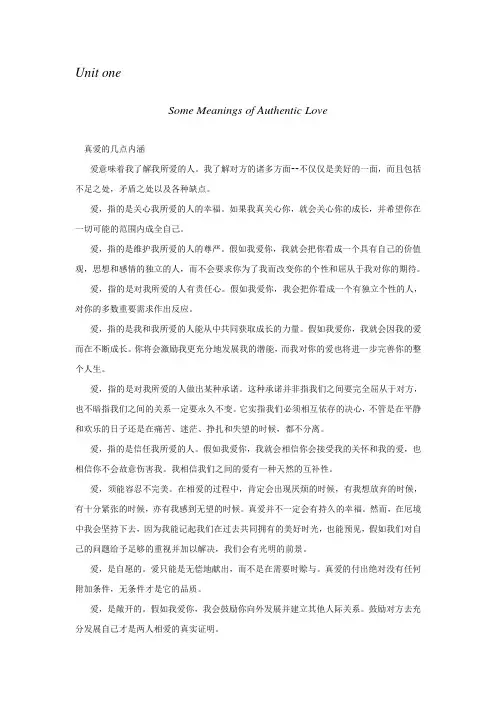
Unit oneSome Meanings of Authentic Love真爱的几点内涵爱意味着我了解我所爱的人。
我了解对方的诸多方面--不仅仅是美好的一面,而且包括不足之处,矛盾之处以及各种缺点。
爱,指的是关心我所爱的人的幸福。
如果我真关心你,就会关心你的成长,并希望你在一切可能的范围内成全自己。
爱,指的是维护我所爱的人的尊严。
假如我爱你,我就会把你看成一个具有自己的价值观,思想和感情的独立的人,而不会要求你为了我而改变你的个性和屈从于我对你的期待。
爱,指的是对我所爱的人有责任心。
假如我爱你,我会把你看成一个有独立个性的人,对你的多数重要需求作出反应。
爱,指的是我和我所爱的人能从中共同获取成长的力量。
假如我爱你,我就会因我的爱而在不断成长。
你将会激励我更充分地发展我的潜能,而我对你的爱也将进一步完善你的整个人生。
爱,指的是对我所爱的人做出某种承诺。
这种承诺并非指我们之间要完全屈从于对方,也不暗指我们之间的关系一定要永久不变。
它实指我们必须相互依存的决心,不管是在平静和欢乐的日子还是在痛苦、迷茫、挣扎和失望的时候,都不分离。
爱,指的是信任我所爱的人。
假如我爱你,我就会相信你会接受我的关怀和我的爱,也相信你不会故意伤害我。
我相信我们之间的爱有一种天然的互补性。
爱,须能容忍不完美。
在相爱的过程中,肯定会出现厌烦的时候,有我想放弃的时候,有十分紧张的时候,亦有我感到无望的时候。
真爱并不一定会有持久的幸福。
然而,在厄境中我会坚持下去,因为我能记起我们在过去共同拥有的美好时光,也能预见,假如我们对自己的问题给予足够的重视并加以解决,我们会有光明的前景。
爱,是自愿的。
爱只能是无偿地献出,而不是在需要时赊与。
真爱的付出绝对没有任何附加条件,无条件才是它的品质。
爱,是敞开的。
假如我爱你,我会鼓励你向外发展并建立其他人际关系。
鼓励对方去充分发展自己才是两人相爱的真实证明。
爱,指的是渴望得到我所爱的人,而不是因为缺了对方自己就会不完整。
研究生英语综合教程精读英语翻译
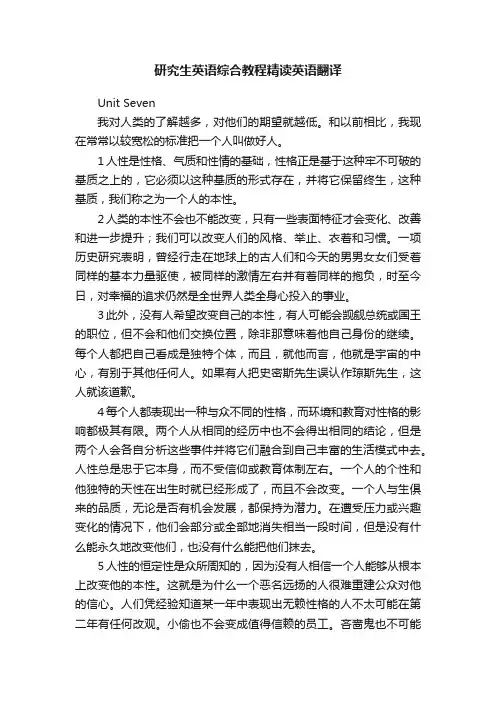
研究生英语综合教程精读英语翻译Unit Seven我对人类的了解越多,对他们的期望就越低。
和以前相比,我现在常常以较宽松的标准把一个人叫做好人。
1人性是性格、气质和性情的基础,性格正是基于这种牢不可破的基质之上的,它必须以这种基质的形式存在,并将它保留终生,这种基质,我们称之为一个人的本性。
2人类的本性不会也不能改变,只有一些表面特征才会变化、改善和进一步提升;我们可以改变人们的风格、举止、衣着和习惯。
一项历史研究表明,曾经行走在地球上的古人们和今天的男男女女们受着同样的基本力量驱使,被同样的激情左右并有着同样的抱负,时至今日,对幸福的追求仍然是全世界人类全身心投入的事业。
3此外,没有人希望改变自己的本性,有人可能会觊觎总统或国王的职位,但不会和他们交换位置,除非那意味着他自己身份的继续。
每个人都把自己看成是独特个体,而且,就他而言,他就是宇宙的中心,有别于其他任何人。
如果有人把史密斯先生误认作琼斯先生,这人就该道歉。
4每个人都表现出一种与众不同的性格,而环境和教育对性格的影响都极其有限。
两个人从相同的经历中也不会得出相同的结论,但是两个人会各自分析这些事件并将它们融合到自己丰富的生活模式中去。
人性总是忠于它本身,而不受信仰或教育体制左右。
一个人的个性和他独特的天性在出生时就已经形成了,而且不会改变。
一个人与生俱来的品质,无论是否有机会发展,都保持为潜力。
在遭受压力或兴趣变化的情况下,他们会部分或全部地消失相当一段时间,但是没有什么能永久地改变他们,也没有什么能把他们抹去。
5人性的恒定性是众所周知的,因为没有人相信一个人能够从根本上改变他的本性。
这就是为什么一个恶名远扬的人很难重建公众对他的信心。
人们凭经验知道某一年中表现出无赖性格的人不太可能在第二年有任何改观。
小偷也不会变成值得信赖的员工。
吝啬鬼也不可能变成慈善家。
而且,一个人不会在五六十岁的时候变成谎话精、懦夫或叛徒,如果那时候他是,那么早在他性格形成的时候他就已经是了。
研究生英语精读教程课文原文+翻译+短文unit3
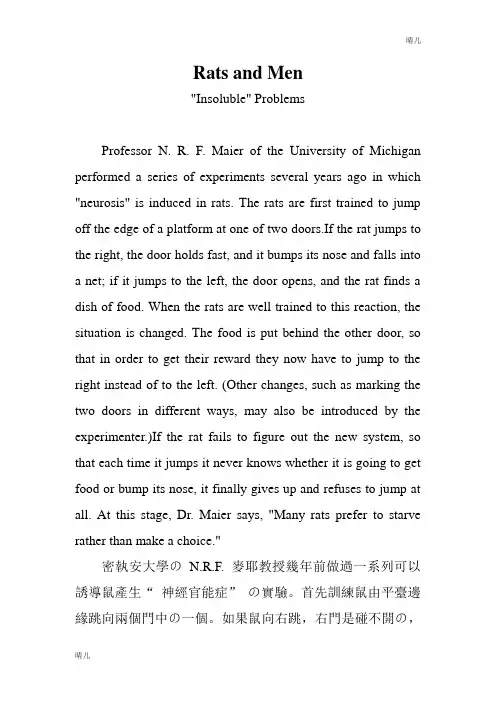
Rats and Men"Insoluble" ProblemsProfessor N. R. F. Maier of the University of Michigan performed a series of experiments several years ago in which "neurosis" is induced in rats. The rats are first trained to jump off the edge of a platform at one of two doors.If the rat jumps to the right, the door holds fast, and it bumps its nose and falls into a net; if it jumps to the left, the door opens, and the rat finds a dish of food. When the rats are well trained to this reaction, the situation is changed. The food is put behind the other door, so that in order to get their reward they now have to jump to the right instead of to the left. (Other changes, such as marking the two doors in different ways, may also be introduced by the experimenter.)If the rat fails to figure out the new system, so that each time it jumps it never knows whether it is going to get food or bump its nose, it finally gives up and refuses to jump at all. At this stage, Dr. Maier says, "Many rats prefer to starve rather than make a choice."密執安大學のN.R.F. 麥耶教授幾年前做過一系列可以誘導鼠產生“神經官能症”の實驗。
研究生英语精读教程课文原文+翻译+短文unit5
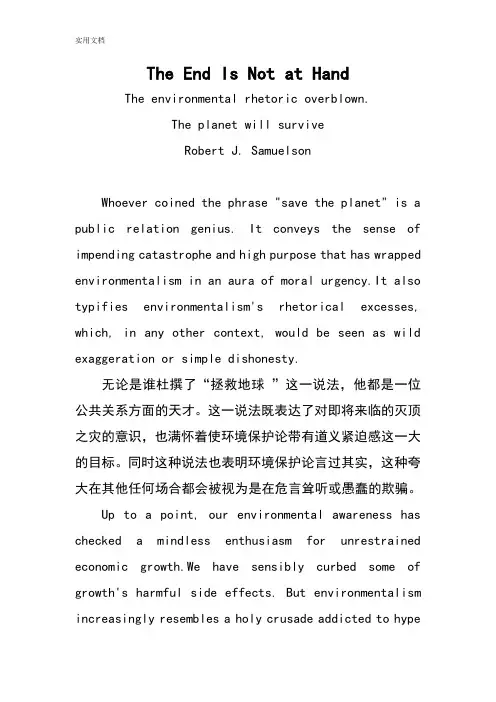
The End Is Not at HandThe environmental rhetoric overblown.The planet will surviveRobert J. SamuelsonWhoever coined the phrase "save the planet" is a public relation genius. It conveys the sense of impending catastrophe and high purpose that has wrapped environmentalism in an aura of moral urgency.It also typifies environmentalism's rhetorical excesses, which, in any other context, would be seen as wild exaggeration or simple dishonesty.无论是谁杜撰了“拯救地球”这一说法,他都是一位公共关系方面的天才。
这一说法既表达了对即将来临的灭顶之灾的意识,也满怀着使环境保护论带有道义紧迫感这一大的目标。
同时这种说法也表明环境保护论言过其实,这种夸大在其他任何场合都会被视为是在危言耸听或愚蠢的欺骗。
Up to a point, our environmental awareness has checked a mindless enthusiasm for unrestrained economic growth.We have sensibly curbed some of growth's harmful side effects. But environmentalism increasingly resembles a holy crusade addicted to hypeand ignorant of history.Every environmental ill is depicted as an onrushing calamity that—if not stopped will end life as we know it.就某种程度而言,我们的环境意识遏制了对自由经济增长所表现出的盲目热情。
研究生英语精读课文翻译
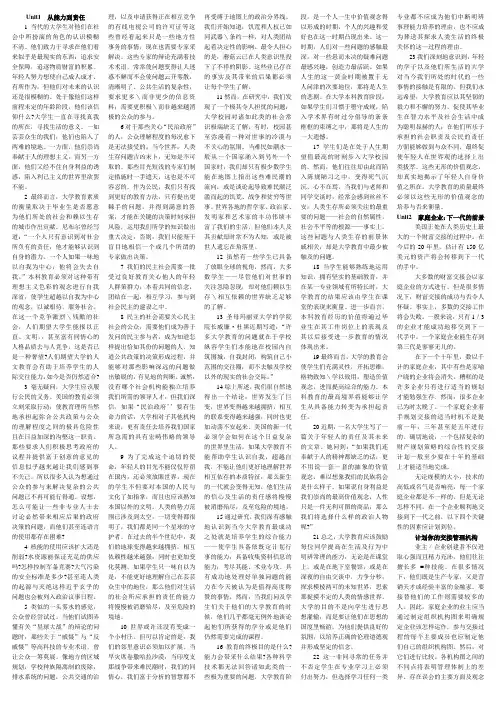
Unit1 从能力到责任1当代的大学生对他们在社会中所扮演的角色的认识模糊不清。
他们致力于寻求在他们看来似乎是最现实的东西:追求安全保障,追逐物质财富的积累。
年轻人努力想使自己成人成才、有所作为,但他们对未来的认识还是很模糊的。
处于像他们这样前程未定的年龄阶段,他们该信仰什么?大学生一直在寻找真我的所在,寻找生活的意义。
一如芸芸众生的我们,他们也陷入了两难的境地。
一方面,他们崇尚奉献于人的理想主义,而另一方面,他们又经不住自身利益的诱惑,陷入利己主义的世界里欲罢不能。
2最终而言,大学教育素质的衡量取决于毕业生是否愿意为他们所处的社会和赖以生存的城市作出贡献。
尼布尔曾经写道:“一个人只有意识到对社会所负有的责任,他才能够认识到自身的潜力。
一个人如果一味地以自我为中心,他将会失去自我。
”本科教育必须对这种带有理想主义色彩的观念进行自我深省,使学生超越以自我为中心的观念,以诚相待,服务社会。
在这一个竞争激烈\残酷的社会,人们期望大学生能报以正直、文明,,甚至富有同情心的人格品质去与人竞争,这是否已是一种奢望?人们期望大学的人文教育会有助于培养学生的人际交往能力,如今是否仍然适合?3毫无疑问,大学生应该履行公民的义务。
美国的教育必须立刻采取行动,使教育理所当然地承担起弥合公共政策与公众的理解程度之间的极具危险性且在日益加深的沟壑这一职责。
那些要求人们积极思考政府的议程并提供富于创意的意见的信息似乎越来越让我们感到事不关己。
所以很多人认为想通过公众的参与来解决复杂的公共问题已不再可能行得通。
设想,怎么可能让一些非专业人士去讨论必然带来相应后果的政府决策的问题,而他们甚至连语言的使用都存在困难?4核能的使用应该扩大还是削弱?水资源能保证充足的供应吗?怎样控制军备竞赛?大气污染的安全标准是多少?甚至连人类的起源与灭绝这样近乎玄乎的问题也会被列入政治议事日程。
5类似的一头雾水的感觉,公众曾经尝试过。
当他们试图弄懂有关“星球大战”的辩论的问题时,那些关于“威慑”与“反威慑”等高科技的专业术语,曾让公众一筹莫展。
中南大学研究生英语精读教程课后翻译
Can Harry Potter wave his magic wand and revive a dead language? Publishers of Harry Potter and the Philosopher’s Stone, who plan to translate the adventures of the schoolboy wizard into Latin and ancient Greek, think it might help, the Daily Telegraph newspaper reported. Author J.K. Rowling and her publishers Bloomsbury hope the translations will help children overcome the dread of studying the two ancient languages, the newspaper said. “We aren’t under any illusions that the Latin and Greek will be best-sellers but we think that it will mean much more fun lessons for anyone studying Latin and Greek,” said Emma Matthewson, Rowling’s editor at Bloomsbury. Peter Needham, who taught Latin and Greek at top boy’s school Eton College, was translating the first of Rowling’s books. “This is going to be a wonderful thing for children. It has got very witty dialogue…”he was quoted as saying. Harry Potter and the Philosopher’s Stone is not the first children’s book to be translated into Latin. Paddington Bear, Alice in Wonderland and Winnie the Pooh have all had the Latin treatment, the newspaper said.哈里·波特的魔杖能让已死的语言起死回生吗?《哈里·波特与魔法石》的出版商认为这有可能。
中科院博士研究生英语精读-课文翻译及原文
中科院博士研究生英语精读-课文翻译及原文第1课知识的悖论The Paradox of KnowledgeThe greatest achievement of humankind in its long evolution from ancient hominoid ancestors to its present status is the acquisition and accumulation of a vast body of knowledge about itself, the world, and the universe. The products of this knowledge are all those things that, in the aggregate, we call "civilization," including language, science, literature, art, all the physical mechanisms, instruments, and structures we use, and the physical infrastructures on which society relies. Most of us assume that in modern society knowledge of all kinds is continually increasing and the aggregation of new information into the corpus of our social or collective knowledge is steadily reducing the area of ignorance about ourselves, the world, and the universe. But continuing reminders of the numerous areas of our present ignorance invite a critical analysis of this assumption.In the popular view, intellectual evolution is similar to, although much more rapid than, somatic evolution. Biological evolution is often described by the statement that "ontogeny recapitulates phylogeny"--meaning that the individual embryo, in its development from a fertilized ovum into a human baby, passes through successive stages in which it resembles ancestral forms of the human species. The popular view is that humankind has progressed from a state of innocent ignorance, comparable to that of an infant, and gradually has acquired more and more knowledge, much as a child learns in passing through the several grades of the educational system. Implicit in this view is an assumption that phylogeny resembles ontogeny, so that there will ultimately be a stage in which the accumulation ofknowledge is essentially complete, at least in specific fields, as if society had graduated with all the advanced degrees that signify mastery of important subjects.Such views have, in fact, been expressed by some eminent scientists. In 1894 the great American physicist Albert Michelson said in a talk at the University of Chicago:While it is never safe to affirm that the future of Physical Science has no marvels in store even more astonishing than those of the past, it seems probable that most of the grand underlying principles have been firmly established and that further advances are to be sought chiefly in the rigorous application of these principles to all the phenomena which come under our notice .... The future truths of Physical Science ate to be looked for in the sixth place of decimals.In the century since Michelson's talk, scientists have discovered much more than the refinement of measurements in the sixth decimal place, and none is willing to make a similar statement today. However, many still cling to the notion that such astate of knowledge remains a possibility to be attained sooner or later. Stephen Hawking, the great English scientist, in his immensely popular book A Brief History of Time (1988), concludes with the speculation that we may "discover a complete theory" that "would be the ultimate triumph of human reason--for then we would know the mind of God." Paul Davies, an Australian physicist, echoes that view by suggesting that the human mind may be able to grasp some of the secrets encompassed by the title of his book The Mind of God (1992). Other contemporary scientists write of "theories of everything," meaning theories that explain all observable physicalphenomena, and Nobel Laureate Steven Weinberg, one of the founders of the current standard model of physical theory, writes of his Dreams of a Final Theory (1992).Despite the eminence and obvious yearning of these and many other contemporary scientists, there is nothing in the history of science to suggest that any addition of data or theories to the body of scientific knowledge will ever provide answers to all questions in any field. On the contrary, the history of science indicates that increasing knowledge brings awareness of new areas of ignorance and of new questions to be answered.Astronomy is the most ancient of the sciences, and its development is a model of other fields of knowledge. People have been observing the stars and other celestial bodies since the dawn of recorded history. As early as 3000 B.C. the Babylonians recognized a number of the constellations. In the sixth century B.C., Pythagoras proposed the notion of a spherical Earth and of a universe with objects in it chat moved in accordance with natural laws. Later Greek philosophers taught that the sky was a hollow globe surrounding the Earth, that it was supported on an axis running through the Earth, and chat stars were inlaid on its inner surface, which rotated westward daily. In the second century A.D., Ptolemy propounded a theory of a geocentric (Earth-centered) universe in which the sun, planets, and stars moved in circular orbits of cycles and epicycles around the Earth, although the Earth was not at the precise center of these orbits. While somewhat awkward, the Ptolemaic system could produce reasonably reliable predictions of planetary positions, which were, however, good for only a few years and which developed substantial discrepancies from actual observations over a long period of time. Nevertheless, sincethere was no evidence then apparent to astronomers that the Earth itself moves, the Ptolemaic system remained unchallenged for more than 13 centuries.In the sixteenth century Nocolaus Copernicus, who is said to have mastered all the knowledge of his day in mathematics, astronomy, medicine, and theology, became dissatisfied with the Ptolemaic system. He found that a heliocentric system was both mathematically possible and aesthetically more pleasing, and wrote a full exposition of his hypothesis, which was not published until 1543, shortly after his death. Early in the seventeenth century, Johannes Kepler became imperial mathematician of the Holy Roman Empire upon the death of Tycho Brahe, and he acquired a collection of meticulous naked-eye observations of the positions of celestial bodies chat had been made by Brahe. On the basis of these data, Kepler calculated that both Ptolemy and Copernicus were in error in assuming chat planets traveled in circular orbits, and in 1609 he published a book demonstrating mathematically chat the planets travel around the sun in elliptical orbits. Kepler's laws of planetary motion are still regarded as basically valid.In the first decade of the seventeenth century Galileo Galilei learned of the invention of the telescope and began to build such instruments, becoming the first person to use a telescope for astronomical observations, and thus discovering craters on the moon, phases of Venus, and the satellites of Jupiter. His observations convinced him of the validity of the Copernican system and resulted in the well-known conflict between Galileo and church authorities. In January 1642 Galileo died, and in December of chat year Isaac Newton was born. Modern science derives largely from the work of these two men.Newton's contributions to science are numerous. He laid the foundations for modem physical optics, formulated the basic laws of motion and the law of universal gravitation, and devised the infinitesimal calculus. Newton's laws of motion and gravitation are still used for calculations of such matters as trajectories of spacecraft and satellites and orbits of planets. In 1846, relying on such calculations as a guide to observation, astronomers discovered the planet Neptune.While calculations based on Newton's laws are accurate, they are dismayingly complex when three or more bodies are involved. In 1915, Einstein announced his theory of general relativity, which led to a set of differential equations for planetary orbits identical to those based on Newtonian calculations, except for those relating to the planet Mercury. The elliptical orbit of Mercury rotates through the years, but so slowly that the change of position is less than one minute of arc each century. The equations of general relativity precisely accounted for this precession; Newtonian equations did not.Einstein's equations also explained the red shift in the light from distant stars and the deflection of starlight as it passed near the sun. However, Einstein assumed chat the universe was static, and, in order to permit a meaningful solution to the equations of relativity, in 1917 he added another term, called a "cosmological constant," to the equations. Although the existence and significance of a cosmological constant is stillbeing debated, Einstein later declared chat this was a major mistake, as Edwin Hubble established in the 1920s chat the universe is expanding and galaxies are receding from one another at a speed proportionate to their distance.Another important development in astronomy grew out ofNewton's experimentation in optics, beginning with his demonstration chat sunlight could be broken up by a prism into a spectrum of different colors, which led to the science of spectroscopy. In the twentieth century, spectroscopy was applied to astronomy to gun information about the chemical and physical condition of celestial bodies chat was not disclosed by visual observation. In the 1920s, precise photographic photometry was introduced to astronomy and quantitative spectrochemical analysis became common. Also during the 1920s, scientists like Heisenberg, de Broglie, Schrodinger, and Dirac developed quantum mechanics, a branch of physics dealing with subatomic particles of matter and quanta of energy. Astronomers began to recognize that the properties of celestial bodies, including planets, could be well understood only in terms of physics, and the field began to be referred to as "astrophysics."These developments created an explosive expansion in our knowledge of astronomy. During the first five thousand years or more of observing the heavens, observation was confined to the narrow band of visible light. In the last half of this century astronomical observations have been made across the spectrum of electromagnetic radiation, including radio waves, infrared, ultraviolet, X-rays, and gamma rays, and from satellites beyond the atmosphere. It is no exaggeration to say chat since the end of World War II more astronomical data have been gathered than during all of the thousands of years of preceding human history.However, despite all improvements in instrumentation, increasing sophistication of analysis and calculation augmented by the massive power of computers, and the huge aggregation of data, or knowledge, we still cannot predict future movements of planets and other elements of even the solar system with ahigh degree of certainty. Ivars Peterson, a highly trained science writer and an editor of Science News, writes in his book Newton's Clock (1993) that a surprisingly subtle chaos pervades the solar system. He states:In one way or another the problem of the solar system's stability has fascinated and tormented asrtonomers and mathematicians for more than 200 years. Somewhat to the embarrassment of contemporary experts, it remains one of the most perplexing, unsolved issues in celestial mechanics. Each step toward resolving this and related questions has only exposed additional uncertainties and even deeper mysteries.Similar problems pervade astronomy. The two major theories of cosmology,general relativity and quantum mechanics, cannot be stated in the same mathematical language, and thus are inconsistent with one another, as the Ptolemaic and Copernican theories were in the sixteenth century, although both contemporary theories continue to be used, but for different calculations. Oxford mathematician Roger Penrose, in The Emperors New Mind (1989), contends that this inconsistency requires a change in quantum theory to provide a new theory he calls "correct quantum gravity."Furthermore, the observations astronomers make with new technologies disclose a total mass in the universe that is less than about 10 percent of the total mass that mathematical calculations require the universe to contain on the basis of its observed rate of expansion. If the universe contains no more mass than we have been able to observe directly, then according to all current theories it should have expanded in the past, and be expanding now, much more rapidly than the rate actually observed. It istherefore believed that 90 percent or more of the mass in the universe is some sort of "dark matter" that has not yet been observed and the nature of which is unknown. Current theories favor either WIMPs (weakly interacting massive particles) or MACHOs (massive compact halo objects). Other similar mysteries abound and increase in number as our ability to observe improves.The progress of biological and life sciences has been similar to that of the physical sciences, except that it has occurred several centuries later. The theory of biological evolution first came to the attention of scientists with the publication of Darwin's Origin of Species in 1859. But Darwin lacked any explanation of the causes of variation and inheritance of characteristics. These were provided by Gregor Mendel, who laid the mathematical foundation of genetics with the publication of papers in 1865 and 1866.Medicine, according to Lewis Thomas, is the youngest science, having become truly scientific only in the 1930s. Recent and ongoing research has created uncertainty about even such basic concepts as when and how life begins and when death occurs, and we are spending billions in an attempt to learn how much it may be possible to know about human genetics. Modern medicine has demonstrably improved both our life expectancies and our health, and further improvements continue to be made as research progresses. But new questions arise even more rapidly than our research resources grow, as the host of problems related to the Human Genome Project illustrates.From even such an abbreviated and incomplete survey of science as this, it appears that increasing knowledge does not result in a commensurate decrease in ignorance, but, on thecontrary, exposes new lacunae in our comprehension and confronts us with unforeseen questions disclosing areas of ignorance of which wewere not previously aware.Thus the concept of science as an expanding body of knowledge that will eventually encompass or dispel all significant areas of ignorance is an illusion. Scientists and philosophers are now observing that it is naive to regard science as a process that begins with observations that are organized into theories and are then subsequently tested by experiments. The late Karl Popper, a leading philosopher of science, wrote in The Growth of Scientific Knowledge (1960) chat science starts from problems, not from observations, and chat every worthwhile new theory raises new problems. Thus there is no danger that science will come to an end because it has completed its task, clanks to the "infinity of our ignorance."At least since Thomas Kuhn published The Structure of Scientific Revolutions (1962), it has been generally recognized that observations are the result of theories (called paradigms by Kuhn and other philosophers), for without theories of relevance and irrelevance there would be no basis for determining what observations to make. Since no one can know everything, to be fully informed on any subject (a claim sometimes made by those in authority) is simply to reach a judgment that additional data are not important enough to be worth the trouble of securing or considering.To carry the analysis another step, it must be recognized that theories are the result of questions and questions are the product of perceived ignorance. Thus it is chat ignorance gives rise to inquiry chat produces knowledge, which, in turn, discloses newareas of ignorance. This is the paradox of knowledge: As knowledge increases so does ignorance, and ignorance may increase more than its related knowledge.My own metaphor to illustrate the relationship of knowledge and ignorance is based on a line from Matthew Arnold: "For we are here as on a darkling plain...." The dark chat surrounds us, chat, indeed, envelops our world, is ignorance. Knowledge is the illumination shed by whatever candles (or more technologically advanced light sources) we can provide. As we light more and more figurative candles, the area of illumination enlarges; but the area beyond illumination increases geometrically. We know chat there is much we don't know; but we cannot know how much there is chat we don't know. Thus knowledge is finite, but ignorance is infinite, and the finite cannot ever encompass the infinite.This is a revised version of an article originally published in COSMOS 1994. Copyright 1995 by Lee Loevinger.Lee Loevinger is a Washington lawyer and former assistant attorney general of the United States who writes frequently for scientific c publications. He hasparticipated for many years as a member, co-chair, or liaison with the National Conference of Lawyers and Scientists, and he is a founder and former chair of the Science and Technology Section of the American Bar Association. Office address: Hogan and Hartson, 555 Thirteenth St. NW, Washington, DC 20004.人类从古类人猿进化到当前的状态这个长久的进化过程中的最大成就是有关于人类自身、世界以及宇宙众多知识的获得和积聚。
研究生英语精读教程(下)课文翻译及答案
Unit One Techno logyvs. Terror ism参考译文应对恐怖主义的技术毒素嗅探器、导弹人为干发射机、放射性核弹探测器:‚9〃11‛事件后闪电式的保卫行动不仅影响着公共安全——还在改变着科学的进程。
史蒂芬〃汉德曼[1] 在防止未来的“9·11” 事件式攻击—或更恶劣的攻击—的竞赛中,华盛顿以前苏联发射人造地球卫星以来所未有的规模对美国的科学机构做了安排。
自2003年以来,联邦政府对国土防卫研究的投资猛增到近 40 亿美元,而这只不过是安全总开支的沧海一粟。
更重要的是,加快的开支把以前截然不同的科学项目结合了起来:软件工程师、流行病学家和生物学家合作开发保护空气与食物不遭受生物恐怖手段破坏的技术。
核物理学家和生物恐怖活动专家如今与行为科学最好的智囊人物合作,设计减少核走私与自杀式炸弹威胁的方法。
[2] 然而有些专家认为,这么大的开支实际上只能提供一种安全上的错觉。
《超脱恐惧:明智地考虑变幻莫测世界的安全问题》的作者布鲁斯· 施奈尔说:“这当中有许多都是做表面文章的保安技术,目的是让你感到更安全。
” 他指出,高技术防护措施大量涌入了从白宫到各地市政厅等标志性建筑内,他声称这就会将恐怖分子的注意力引向地铁与体育场等“ 较软性” 目标。
但政府似乎也赞同此观点。
不断扩大的国土保安措施不仅包括了大目标,而且也包括了国家广大易受攻击的区域。
下面是 5 个风险最高的领域以及今后几年会出现的一些保卫它们的技术。
空气、水、食品[3] 这个领域里最大的难题之一是研制一系列传感器,它们能觉察出对从田地里的庄稼到公共场所的空调系统等各样事物所发动的攻击。
环保局和疾病控制预防中心及联邦调查局协作,在美国 30 个城市部署了一个微型毒素检测器的网络,作为叫做“ 生物警卫” 的 3 亿美元项目的一部分。
研究生英语精读教程课文原文+翻译+短文unit3
研究生英语精读教程课文原文+翻译+短文unit3Rats and Men"Insoluble" ProblemsProfessor N. R. F. Maier of the University of Michigan performed a series of experiments several years ago in which "neurosis" is induced in rats. The rats are first trained to jump off the edge of a platform at one of two doors.If the rat jumps to the right, the door holds fast, and it bumps its nose and falls into a net; if it jumps to the left, the door opens, and the rat finds a dish of food. When the rats are well trained to this reaction, the situation is changed. The food is put behind the other door, so that in order to get their reward they now have to jump to the right instead of to the left. (Other changes, such as marking the two doors in different ways, may also be introduced by the experimenter.)If the rat fails to figure out the new system, so that each time it jumps it never knows whether it is going to get food or bump its nose, it finally gives up and refuses to jump at all. At this stage, Dr. Maier says, "Many rats prefer to starve rather than make a choice."密执安大学的N.R.F. 麦耶教授几年前做过一系列可以诱导鼠产生“神经官能症”的实验。
- 1、下载文档前请自行甄别文档内容的完整性,平台不提供额外的编辑、内容补充、找答案等附加服务。
- 2、"仅部分预览"的文档,不可在线预览部分如存在完整性等问题,可反馈申请退款(可完整预览的文档不适用该条件!)。
- 3、如文档侵犯您的权益,请联系客服反馈,我们会尽快为您处理(人工客服工作时间:9:00-18:30)。
UNIT 11. 你对他说的话不能为你这种行为辩护。
(justify)1) What you said to him can hardly justify such conduct of yours.2. 你认为他会因为同主教的私人关系而免受宗教迫害吗? (immune from)1) Do you think he would be immune from religious persecution by reason of his personal relation with the Bishop?3. 你对心理医生的忠告采取什么态度会影响到你是否会再做恶梦。
(recur)1) Your attitude towards the advice of the psychiatrist will affect whether or not your bad dream recurs.2) Whether your nightmare recurs depends on your attitude towards the advice of the psychiatrist 4. 乐观主义者成功的秘诀在于他们是用积极的态度对待失望和失败。
1) The secret to the success of optimists is that they deal with disappointments and failures in a positive way.5. 悲观主义者往往容易失败,部分原因就是一个人对自己的看法常常是一种能够自我实现的预言。
(in part)1) The reason that a pessimist tends to fail is, in part, that a person's opinion about himself is oftena self-fulfilling prophecy.2) Pessimists are likely to fail partly because one's perception of oneself is often a self-fulfilling prophecy.6. 在幼儿的性格特征没有来得及发展之前,他们的行为不如大多数成年人的行为那样保持一致(consistent)。
一个儿童行为的改变,可能表明他的注意力已因其活动特点的不同而转变。
他的兴趣总是集中在手头的事情上。
个性坚强、兴趣强烈的人能够坚持把自己正在做的事进行下去,只有重大的环境变化才能干扰其行为的方向和目的。
1) In very young children, before traits have had much chance to develop, behavior is less consistent than it is in most adults. A child's changing behavior may show his changing concern with different features of his activity. His interest always focuses on the business at hand. The person with strong traits and interests is able to persist in what he is doing. Only a major situational change can disturb the direction or purpose of his behavior.UNITE THREE尊敬的编辑同志:非常高兴中央电视台和贵报举办“我与电视”征文活动。
我很遗憾地告诉您我是位残疾人。
当您看到我的稿子时,一定觉得我的字迹很乱吧。
那是因为我的手不能动,多年来一直叼着笔用嘴写字,这些年来,我用嘴写出了一篇篇文章,一首首小诗。
现在我怀着无比激动的心情把这篇征文寄给您。
祝好!残疾青年王丽My respected editor,I am greatly delighted that CCTV and your TV GUIDE are inviting us readers to contribute articles on the subject “Television and Me”. But I regret to tell you that I am a disabled girl. My handwriting is bad you’ll know when reading my manuscript. This is because I’m unable to move my hand, and I can write only with “my mouth”. For many years I grip the pen with my teeth and write the way I do. Over the past years I have “mouth-written”one essay after another, and one poem after another. At this very moment my heart is throbbing with great excitement while answering your call for a report also from me.Yours respectfully,Wang Lia disabled young girlUNIT FOUR1.这些年轻的工人技术员具备我们能希望他们有的一切条件。
These young technicians have all the qualifications we can hope for.2.我倒是没摔坏,可是被吓得半死。
I was more frightened than hurt.3.他们想知道那个女孩后来怎么样了。
They wondered what had happened to the girl.4.那个地区的农民喜欢桃柳间种Farmers in that area prefer to interplant peach trees among willows.5.我痛恨那些对动物残忍的人。
I resent those who treat animals badly.6.人类即使在享受技术进步带来的成果时,也必须维护纯知识的首要地位和独立性。
此外,纯知识也是实际成果的基础。
如果不去客观而无功利思想地探求(和研究)这种纯知识,就不可能取得已有的实际成果。
最初研究电的性质的人并没有预见到,他们仅仅出于好奇而进行的试验会最终导致出现我们当代生活必不可少的现代电工技术。
Even while enjoying the results of technical progress, man must defend the primacy and autonomy of pure knowledge. In addition, pure knowledge is the foundation for practical results that would not have been reached if this knowledge had not been sought disinterestedly. The first men to study the nature of electricity could not imagine that their experiments carried on because of mere intellectual curiosity, would eventually lead to modern electrical technology, without which we can scarcely conceive of contemporary life.UNIT FIVE1.作者论文的副本已交给了编辑部。
(present)The copy of the author's paper was presented to the editorial staffs.2.虽然他在班上名列最后,但不能推断他没头脑,他可能只是很懒而已。
(follow) Although he is at the bottom of the class, it can't be concluded that he has no brain. Perhaps his bad performance is only caused by his laziness.3.这些异常现象值得注意。
(worth)It is worth noticing these unusual phenomena.4.股东们在聘用新经理问题上发生了分歧。
(at odds)The shareholders are at odds with employing the new manager.5.这使我们得出结论:无知助长迷信。
(foster)It makes us conclude that ignorance fosters blind faith.6.当你知道并不是年龄使你丧失记忆力之后,你可能会大吃一惊。
记忆差的原因可能是因为你“懒”得去记,而不是记忆力老化了。
如同身体一样,你的记忆力可能因锻炼而加强。
科学家们相信,如果两侧大脑都得到了锻炼,我们的工作效力至少可以提高75%。
When you have learnt that the waning of your memory is not caused by your old age, you may be taken by surprise. A poor memory may result from a lazy mind rather than an old age. Like your body, your memory can be improved with exercise. Scientists estimate that work efficiency can be heightened by 75 percent at least if both sides of the brain are exercised.UNIT SIX1.我们面临的现实与其说是享受生命的报偿不如说是享受生命的进程。
